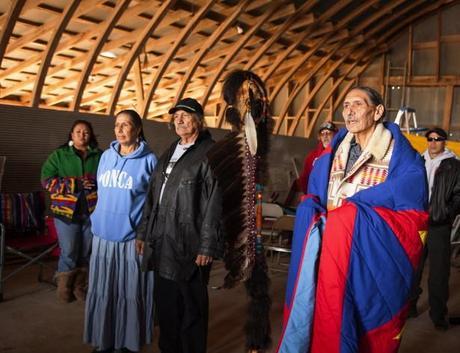by Sara Palmer / Climate-Connections

Activists at the opening ceremony of the Great Plains Tar Sands Resistance Action Camp, near Ponca City, Okla. (Great Plains Tar Sands Resistance/Girard Oz/ Waging Nonviolence)
Indigenous people in Oklahoma took a united front against the Keystone XL pipeline, whose proposed route will trespass upon sacred ritual and burial grounds. Already many of these people, especially those living in Ponca City, struggle daily with pollution-related health issues from nearby refineries. The repercussions of another pipeline, especially one that threatens to degrade their heritage, are simply unfathomable. Interviewed in an article by Crysbel Tejada and Betsy Catlin on the website Waging Nonviolence, longtime activist Casey Camp-Horinek states:
Of the maybe 800 of us that live locally, we have averaged over the last five to seven years maybe one funeral a week. Where we used to have dances every week, now most people are in mourning.
A massive ConocoPhillips oil refinery towers over Standing Bear Park, named in honor of the Ponca chief who led his people on the Trail of Tears. Every year, that refinery pumps 2,000 lbs. of chemicals into the air.
“We live in a situation that could only be described as environmental genocide,” said Camp-Horinek. Beyond the refineries, she explained, “We also have had the misfortune of living on top of a spider web of pipelines as a result of ConocoPhillips being here.”
The toxins released are filled with benzene, which the CDC lists as potentially causing leukemia, anemia and can decrease the size of ovaries. In response to these issues and the Keystone threat, the Indigenous people of the area are planning their resistance and have drafted a new treaty called “Protect the Sacred.”
They have also created the “Training for Resistance” tour, “which is making its way across Greater Sioux nations, territories and reservations to educate and equip people with the necessary tools for resistance. The trainings, which began in March on the Pine Ridge reservation, focus on direct action and teach-ins on tar sands and the Keystone XL, with roots in the Lakota way and tradition.”
Read the full article here and discover how Indigenous people plan to fight back against the Keystone XL, another form of genocide — environmental genocide — faced by nations of people whose history is riddled with the same unjust treatment.

